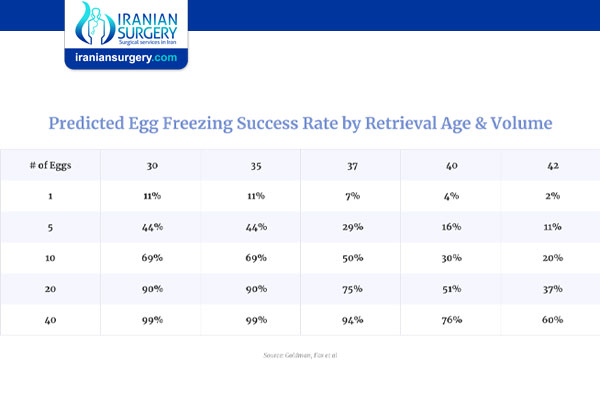Egg Freezing Success Rates by Age
Egg Freezing Success Rates by Age
Women everywhere are taking control of their reproductive health and fertility by opting to freeze their eggs. Egg freezing has allowed women to delay having children until they’re ready to start a family. Women decide to freeze their eggs for many different reasons—delaying motherhood to focus on their career, access to an insurance policy with coverage for the treatment, medical necessity, and more. If you’re considering freezing your eggs, you likely have many questions, one of which being, “What are my chances of getting pregnant when I’m ready to use my frozen eggs?”
There are many factors that can impact egg freezing success rates, but the most significant is age. Studies have shown that the older women are when they freeze their eggs, the probability of getting pregnant later on decreases. The overall number of eggs a woman has, and the quality of those eggs, diminish over time. In fact, the proportion of euploid (normal, healthy) embryos goes from about 76% among 25 to 30-year-olds to 52% among 35 to 40-year-olds. That percentage drops significantly after age 40. That means that double or even triple the typical number of eggs need to be retrieved to achieve similar success rates, but even then, those success rates continue to dwindle with.
When it comes to your fertility health, knowledge is power. Egg freezing is often not top of mind for women in their twenties, but understanding how age impacts success rates can help women of all ages make the right decision for their fertility.
How to Improve Egg Freezing Success Rates
Older women need to freeze many more eggs than a woman in her early twenties to have the same chances of a successful pregnancy. A study by FertilityIQ revealed that “Women who stored 10 eggs after the age of 35, had a 30% success rate. Women under 35 with the same number of eggs had twice that success rate. That’s a big step up, and we’re not done. For women under 35 who managed to bank not 10 eggs, but 20 eggs, their success rate jumped to 80%.”
Egg Freezing vs. Embryo Freezing
Another option associated with a higher success rate than freezing eggs is to fertilize the embryos and freeze them. However, this option is most suitable for women who are in long-term relationships or are married. That way, they can start building their family with their partner when they’re both ready.
Next Steps
If you’ve considered freezing your eggs, we encourage you to take the next step today. Delaying treatment can impact your future chances of having a successful pregnancy. Our team of fertility doctors at Iranian Surgery is here to help you take control of your reproductive future and give you the freedom to start your family when you’re ready.
About Iranian Surgery
Iranian surgery is an online medical tourism platform where you can find the best doctors and fertility specialists in Iran. The price of IVF in Iran can vary according to each individual’s case and will be determined by an in-person assessment with the doctor.
For more information about the cost of IVF in Iran and to schedule an appointment in advance, you can contact Iranian Surgery consultants via WhatsApp number 0098 901 929 0946. This service is completely free.
Source:
https://www.fertilitycenter.com/fertility_cares_blog/how-egg-freezing-success-rates-vary-by-age/


